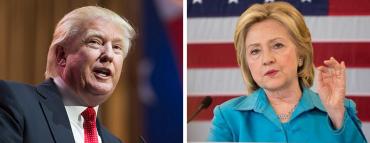
Ever since NBC's Tim Russert wrote "Florida Florida Florida" on a whiteboard during the tumultuous 2000 presidential election, the state has emerged as one of the most significant battlegrounds in the race for 270 electoral votes --- at least in popular imagination.
But in 2012, after President Barack Obama and Republican nominee Mitt Romney poured immense resources into Florida, the state was consigned to a footnote. Obama wasn't definitively declared the winner in Florida for a couple of days --- long after he had clinched re-election.
That has led to a more complicated image for Florida in the current battle between former Secretary of State Hillary Clinton, looking to win a third straight presidential term for the Democrats, and Republican nominee Donald Trump.
Trump certainly needs the Sunshine State. But he might be the only one.
"It's hard (for Republicans) to win without winning Florida," said Susan MacManus, a political-science professor at the University of South Florida. "Whereas, Democrats have proven they could."
At the same time, Trump could prove to have the kind of appeal in Midwestern states that other Republicans have struggled with. Polls have shown the real-estate developer to be competitive in places like Ohio, which Obama won twice, and Pennsylvania, which hasn't voted for a Republican since George H.W. Bush's landslide win in 1988.
"The fact that she is losing a bit and he's gaining a bit in the Rust Belt makes Florida even more important to protect and win for the Democrats," MacManus said.
With Clinton officially picking up her party's nomination at this week's Democratic National Convention in Philadelphia, the battle for 270 electoral votes is taking center stage in the race for the White House. Officials with the Clinton campaign identified Florida as one of roughly 10 states they are focusing on most heavily --- but were hesitant to assign any more or less significance to it based on the current election's dynamics.
"We're going to be in Florida to the end," said Marlon Marshall, director of state campaigns and political engagement for Clinton, "but we're also going to be in states like Pennsylvania to the end."
Republicans, meanwhile, have been more forthright about Florida's role in the electoral college battle
"Your state is going to determine who wins and who loses this campaign," GOP pollster Frank Luntz told Florida Republicans last week. "You in this room are going to determine and you have the power to make a difference in the future of the country."
The results of the battle for Florida in 2012, though, also give Democrats compelling reasons to wage another spirited campaign in the state. Obama's win was part of a banner year for the party, which also re-elected U.S. Sen. Bill Nelson while gaining seats in Congress and both chambers of the Legislature. This year, Democrats' hopes of reclaiming a majority in the U.S. Senate --- something in which Clinton would have a vested interest --- could hinge on whether they can knock off incumbent Republican Marco Rubio in Florida.
"Even if she doesn't need it, she wants it badly --- not only for her but for the down-ballot races," MacManus said.
To that end, Florida is one of several states where Democrats are trying to integrate campaign efforts for several candidates.
"We know we're stronger when we win Florida up and down the ticket," Clinton campaign manager Robby Mook told the Florida convention delegation at a breakfast Wednesday. "That's why we're not running the Hillary Clinton campaign in Florida; we're running the coordinated campaign in Florida."
And while there have not been any major addresses by Florida politicians at the convention in Philadelphia, the state's presence has been felt. Two of the "Mothers of the Movement" who addressed gun violence and police tactics Tuesday night were from Florida.
On Wednesday, Tallahassee Mayor Andrew Gillum --- seen as a rising star in the state party --- spoke at the convention, but well ahead of the prime-time window where speeches are typically more likely to be televised.
Gillum presented his backing for Clinton as something he was doing with his children in mind. And he threw an elbow at Trump's rhetoric.
"Ensuring the kind of future they deserve requires leadership that will unify and inspire us," Gillum said. "That can build on this country's best instincts for inclusion and optimism. The world can seem scary enough --- without so-called leaders leading with fear for political gain."
Clinton's chances of winning Florida, meanwhile, likely depend on how well the "Obama coalition" of young voters and minorities turns out. Those voters have been more eager to show up during presidential elections when Obama was on the ballot, but less so in midterm elections, which have traditionally seen lower turnout across the board.
Polls have shown the race neck-and-neck, despite the fact that Trump has offended several of the state's key voting blocs --- chiefly Latinos. Marshall played down reading too much into the polls right now, though.
"I would say we'll start to truly see where races are post-Labor Day," he said.
David Plouffe, a former campaign manager and senior adviser for Obama, said Clinton could do better in some parts of Florida than the president did --- including North Florida and the suburban parts of the I-4 corridor cutting across the state.
"Florida, to me, is the most fascinating state," Plouffe said.


